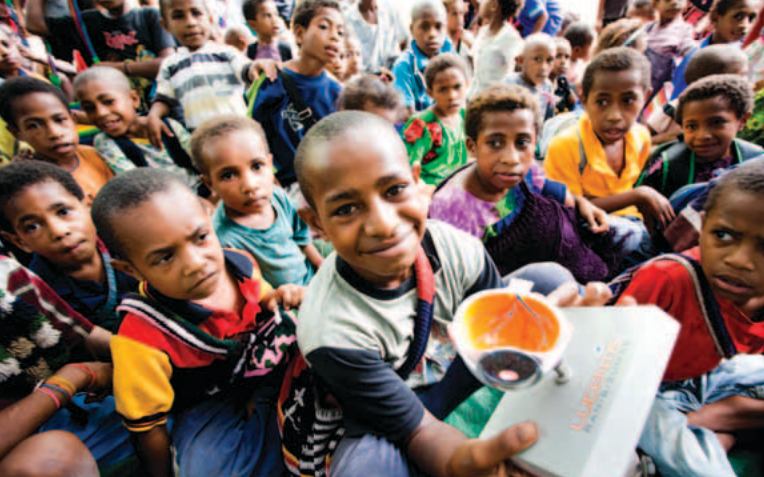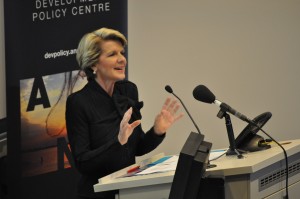AusAID promises performance-based funding of NGOs
On June 20 Parliamentary Secretary for Foreign Affairs Richard Marles, AusAID DG Peter Baxter and CARE CEO Julia Newton-Howes launched AusAID’s new Civil Society Engagement Framework at Parliament House. This sets out how AusAID will work with civil society organisations (whose importance is highlighted in this blog) in the future. Some $500 million of Australian ODA was channelled through NGOs in 2010/11 to both domestic and international NGOs, or CSOs (Civil Society Organizations) as they are called in the document.
So far, core funding to NGOs (through what is known as the AusAID NGO Cooperation Program or ANCP) has been disbursed on a matching funding basis, whereby how much an NGO gets from AusAID depends on how much it raises from the public. However, the Framework promises a new approach, in which judgements on effectiveness will also play a role in determining AusAID funding. The Framework commits the Government to “develop and implement an assessment methodology to guide decisions on increased funding to and through CSOs, taking into account effectiveness… capacity, and relevance to the Australian aid program.”
Another key change relates to accreditation, the process by which AusAID decides whether NGOs should be provided with ANCP funding. According to the Framework, the emphasis of accreditation, which till date has been on governance and financial accountability, will shift to “increase the focus on effectiveness, transparency, accountability, innovation and results.”
This second change will be less problematic, and is long overdue. As highlighted in this post by Dinuk Jayasuria, very few NGOs currently publish independent evaluations of their work.
Other promises made in the new Framework include:
- Incorporation of civil society engagement strategies into all AusAID country strategies
- Development of an agency-wide CSO monitoring and evaluation framework to track results of AusAID funding through CSOs against objectives
- Launching of a civil society portal on AusAID’s website to centralise information on consultation and funding opportunities
- Development of AusAID guidelines for working with CSOs as delivery partners and intermediaries
- Implementation of an approach to providing grants to small and niche Australian community organisations
Julie Bishop spells out coalition policy on foreign aid.
On June 20 Julie Bishop spoke at the ANU on the coalition’s Pacific and foreign aid policies.
On aid, the Shadow Foreign Minister covered issues relating to both aid quantity and quality. On the latter, she said that the Coalition was still committed to an aid/GNI target of 0.5%, but that “[w]ith still another Labour budget scheduled to take place in May next year, before the next election the Coalition cannot now responsibly commit to a target date. To do so would be reckless.” So “[w]e commit to the target of 0.5 per cent of GNI but we cannot now commit to the target date.” Ms Bishop indicated that “We will review the nation’s finances after Labour’s budget and commit to what we can as a nation realistically afford and what we can deliver”, suggesting that a more concrete commitment might be made after the budget but before the election. She emphasized how much aid had increased under the Howard government, and closed her discussion about aid increases by “point[ing] to our record in terms of our commitment”.
On quality, the Deputy Opposition Leader called for “an increased focus on accountability, transparency and a reassessment of priorities within the aid program.” She welcomed the establishment of the Independent Evaluation Committee to oversee the Office of Development Effectiveness, a Howard Government Initiative. Communication of the aid program had to be about “acknowledging failures as well as celebrating successes.” “Improving the quality of independent project completion records,” an area where AusAID had a poor track record, was essential. The Coalition would “ensure that performance benchmarks are developed and implemented,” as recommended by the Independent Review of Aid Effectiveness.
A blog summary of her speech is available here, a transcript here, and a video of the speech is available here.
Gillard to co-chair UN group to make final push for MDGs
United Nations Secretary-General Ban Ki-moon has appointed Prime Minister Julia Gillard to co-chair a group of global leaders and celebrities making a “final push” for implementation of the millennium development goals by the target date of 2015. This appointment has been welcomed by NGOs within Australia (see here and here), but also used by Oxfam to argue for more rapid increases in aid.
Aid visitors, including Tidewater in Australia
Here we highlight the growing importance of the Australian aid program internationally by taking a look at recent aid visitors to Australia. Here is a list from the past month. Please notify us of any omissions:
- From July 1-3, the heads of many OECD aid agencies met in Brisbane for Tidewater (named after the location of the first such meeting in 1968), the OECD’s annual informal high-level meeting that focuses on the latest issues impacting on global development. The convener of the meeting is chair of the OECD DAC (Development Assistance Committee), Brian Atwood (who speaks today at the Lowy institute).
- Homi Kharas of the Brookings Institution, which is funded by the Office of Development Effectiveness to research aid effectiveness, visited Canberra for consultations (He also gave a presentation at the Development Policy Centre, with the video available here).
- Martin Ravallion, the World Bank’s Acting Chief Economist, will visit AusAID this week (and will also be giving a seminar at ANU).
In brief
Foreign Minister Carr has announced a doubling of aid to Myanmar by 2015, bringing the total at that point to around $100m per year, with $80m going to education alone over the next four years.
Prime Minister Gillard has announced a further $97 million in funding for the Civil Society Water, Sanitation and Hygiene (WASH) Fund, welcomed by CARE Australia here [pdf], and Oxfam here.
Peter Baxter has announced that Australian aid to Fiji will double by 2014 to $36m.
After a recent visit to Daru hospital in PNG liberal MP Warren Entsch has condemned the aid program for failing to improve the conditions there, which he says are “disgusting and shocking.”
Judith Sloan, contributing economics editor at the Australian, argues in this piece how AusAID needs to work more effectively.
AusAID has released its response to the Independent Child Protection Policy Review 2011.
ODE has released a series of interviews that it conducted in March discussing emerging Asian donors (transcripts are also available).
AusAID has announced the closure of the Australian Development Gateway (ADG) website, which has been in operation since 2004, claiming that “the need for the website has declined as social networking and knowledge sharing sites and technologies have grown in functionality and popularity.”
AID/WATCH has released its 2011 annual report, available here.
After 21 years with Oxfam Australia Andrew Hewitt has stepped down as Executive Director.
The 8th Australasian Development Economic Workshop (ADEW) took place at Monash university this month with prominent development economist Abhijit Banerjee providing a keynote address. The ADEW was summarised in a blog post here.
Jonathan Pryke is a Researcher at the Development Policy Centre




AusAID promises performance-based funding of NGOs
Noting that some $500 million of Australian ODA was channelled through NGOs in 2010/11 to both domestic and international NGOs, a change of emphasis in their accreditation to “increase the focus on effectiveness, transparency, accountability, innovation and results” is noted.
NGOs are voluntary non-profit organizations that may be uniquely qualified to assist in the preparation, management, and implementation of projects, essentially because of their involvement and knowledge of local issues, community needs, and/or participatory approaches.
If NGOs do have specific expertise by comparison with other forms of delivery mechanisms including Development Banks, Management Companies, that expertise must always be tested under open tender and the evaluation criteria shall reflect the unique qualifications of the specific assignment, such as local knowledge, experience of key staff, scale of operation, delivery effectiveness and efficiency and evaluated past performance.
To subject NGO’s to a lesser form of procurement and contract management than other forms of delivery mechanisms, may produce a governance structure that is not open and transparent, and may not deliver a ‘NGO’ capable of effectively and efficiently delivering the project.
E. John Blunt is an Institutional and Public Procurement Expert with extensive experience in leading public procurement reforms in a variety of international development environments. He has worked in the Pacific, Asia and Africa. He is currently on assignment with the Southern African Development Community Secretariat in Botswana.